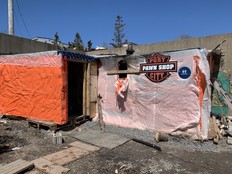Retailers call for crackdown on contraband tobacco industry
Convenience store retailers speak about the need for a national strategy to cut down on illegal tobacco at Atlantic forum

Article content
New Brunswick is introducing new measures to fight the contraband tobacco industry, while a group representing retailers wants to see a national strategy to take on the illegal trade.
Advertisement 2
Story continues below
Article content
The first ever Atlantic Forum on Contraband Tobacco was held on Tuesday in Moncton with speakers from all Atlantic provinces and Quebec.
Danny Fournier, manager of illicit trade prevention for Rothmans Benson & Hedges Canada, said the forum was organized because similar events are strictly for law enforcement. Tuesday’s forum had representatives from law enforcement, private sector, and community stakeholders.
Fournier said he hopes the forum will allow for connections between the private sector and law enforcement, and for discussion about what resources are available when it comes to enforcement for illicit tobacco.
Mike Hammoud, the Atlantic Canada vice-president of the Convenience Industry Council of Canada, said convenience store retailers saw the dramatic effect of contraband tobacco during the COVID-19 pandemic.
For the first few months of the pandemic, restrictions prevented road transportation of contraband tobacco, and many of the manufacturers of the illegal tobacco shut down until about mid-June 2020.
During that time, convenience stores saw a spike in their tobacco sales, but when the restrictions were lifted, the retailers saw a sharp decline in sales.
Typically, tobacco sales make up about 45 per cent of convenience stores’ in-store sales, with a combined $53.6 billion in sales last year, and $25.6 billion in taxes collected.
Data shows that the population of smokers did not decline, nor did convenience store retailers see an increase in demand for vape products, said Hammoud, leaving contraband tobacco as the only other explanation.
Article content
Advertisement 3
Story continues below
Article content
“Not only are we losing the sale of that one product, we’re also losing the sale of other products they can be purchasing,” he said.
The rise of contraband tobacco sales has damaging effects on provinces, said Hammoud, such as lower sales for convenience stores and other legal retailers of tobacco, and negative effects on tax revenues, which are used for government programs.
The illegal tobacco industry is not bound by health regulations, so products can often be laced with other substances, creating new addictions, as well as providing more access for youth.
“Kids today can buy a cigarette probably less than they can candy these days,” he said.

Justice and Public Safety Minister Kris Austin told the forum that New Brunswick is introducing new measures to assist in the crackdown on the illicit industry, such as investments to the Justice and Public Safety Safer Communities program to focus on illegal tobacco, as well as including contraband tobacco in the Safer Communities and Neighbourhoods Act.
The amendment to the SCAN Act will allow law enforcement to shut down properties used for selling contraband tobacco.
Austin said between April 1, 2023 and March 31, 2024, New Brunswick’s justice and public safety officers contributed to the seizure of a total of more than three billion contraband cigarettes destined for New Brunswick, and two million cigarettes seized in partnership with law enforcement in Quebec.
The total tax value of the seized products was $880,000 in provincial taxes and $540,000 in federal taxes, he said.
Advertisement 4
Story continues below
Article content
Fournier said New Brunswick is the gateway to the rest of Atlantic Canada when it comes to selling illegal tobacco.
“If New Brunswick falls then it will be a mess in the rest of Atlantic Canada,” he said.
The private sector can complement efforts by law enforcement, especially for online contraband sales, Fournier added.
Both Fournier and Hammoud said more national coordination is needed to combat contraband tobacco.
“I know the provinces speak in between themselves, but we need that national leader that would be that go-to person,” said Fournier, noting most of the contraband tobacco is made in Ontario and Quebec and distributed to the other provinces. Currently, the provinces have “patchwork strategies” for addressing contraband tobacco, said Hammoud.
Justice and Public Safety Canada did not respond to a request for comment by press time.
John Lunney, deputy chief of Inspection and Enforcement New Brunswick, said the contraband tobacco industry is often tied to organized crime.
When enforcement units investigate contraband tobacco or cannabis sales, many times they will find firearms, and other illegal drugs.
“The criminality in New Brunswick would take advantage of any opportunity to make the money where they can,” he said.
Hammoud said criminals are becoming more brazen with public facing contraband tobacco and cannabis businesses, and online stores.
Article content












Postmedia is committed to maintaining a lively but civil forum for discussion. Please keep comments relevant and respectful. Comments may take up to an hour to appear on the site. You will receive an email if there is a reply to your comment, an update to a thread you follow or if a user you follow comments. Visit our Community Guidelines for more information.